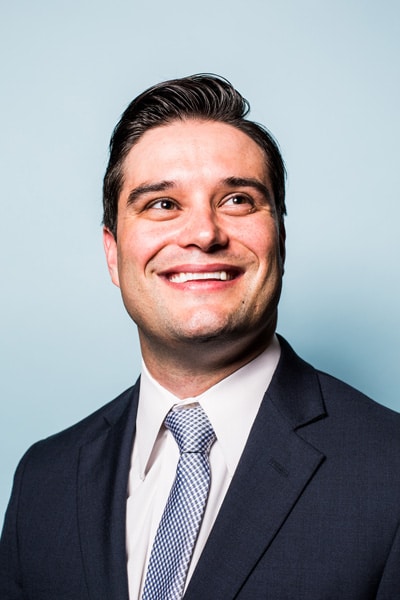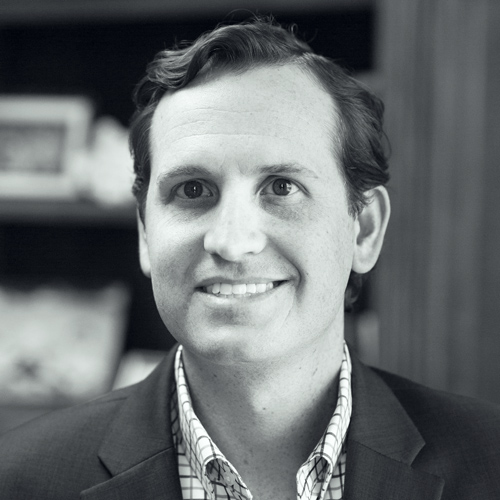You won’t find Matthew Balog donning a surgical mask and carrying a scalpel, but you will find him in scrubs. The director of business operations – surgical services for Advocate Christ Medical Center stays close to the surgeons, working behind the scenes to set the vision and strategy for the surgical services team.
Balog thrives in the field’s demanding atmosphere. “I love the fast-paced surgical environment,” he says. “Every day is a new challenge.” As such, Balog says that it’s imperative that his leadership style remain fluid.
“I adapt my leadership style to match the needs of the project or task on a daily basis,” he explains. While some decisions are protocol-driven, he encourages his staff to solve others on their own. That requires a great deal of trust, an integral component of Balog’s business philosophy.

“I continuously focus on building relationships with my associates and physicians,” he explains. “Trust is the currency of leadership, and I learned quickly that trust isn’t something your title provides. It’s earned and tested each day.” Balog spent the early years of his career engaging directly with the most difficult aspects of his job. “I didn’t want to wait ten years to establish two years of critical conversation experience,” he explains. “I’ve never shied away from a difficult conversation.”
An Ambitious Undertaking
That attitude led to one of Balog’s most ambitious initiatives: reshaping Advocate Christ Medical Center and the way the surgical department collaborates with its surgeons. For him, a surgeon is much like a customer, a description he feels has developed a negative connotation in the industry. “The word customer implies that the consumer has a choice,” he says. “Both my patients and my surgeons have choices. It’s my job to influence them to choose Advocate Christ Medical Center.”
A governance committee was formed to meet the needs of the hospital’s customers. Members of the committee are recognized as the senior leadership of the surgical services department, and their roles and responsibilities include making operational and capital decisions that align with the hospital’s strategic plan. The committee includes several surgeons, which is rarely the case in committees such as these. Even more unique is that the selected surgeons are handpicked.
Although committees for surgeons are common at most hospitals, they’re not as interwoven into the development of the department’s big picture. “These committees often serve as a conduit of information, basically telling physicians what is going on as opposed to a collaborative effort,” Balog explains. “This new model invites our surgeons to have a seat at the table. There, they can vote and have a say in the strategic vision of the department.”
Giving Surgeons a Voice in the Business
Integrating surgeons into Advocate Christ Medical Center’s governance committee helps streamline the decision-making process for everyone involved. For example, in issues of noncompliance, physicians can address their concerns with a fellow physician instead of an administrator. Through intimate conversations like these, the committee allows for more transparency and greater accountability.
“I wouldn’t say it’s the first time ever that physicians were holding each other accountable,” Balog says. “But it was a culture shift in that it’s not an administrative, top-down approach.”
Other benefits of this model include Balog and his team’s ability to recruit “champion ambassadors.” These are surgeons who can help cultivate support for the department’s key initiatives from their colleagues. They will be important as Balog works with his dedicated project management team to steer Advocate Christ Medical Center’s surgical services team toward the future. Having a presence on a governance board means that you have the patient, physician, and department interests in mind.
Improving Patient Outcomes
“Once we’re all rowing in the same direction, this alignment will naturally begin to break down the issues and help identify more opportunities for improvement,” he says.
This new method boils down to ensuring that the patient is receiving the safest, most efficient care with the best outcomes. “In healthcare, we find common ground in the intrinsic motivation to care for our patients,” Balog explains.
This new governance committee proves that philosophy; as far removed as it is from the operating room, it is driving necessary changes in the department. Those within it are making an impact that will refine and fortify Advocate Christ Medical Center’s core mission, which is to create “the best place for patients to heal, physicians to practice, and associates to work.” By remaining close to everyone that his work affects, Balog is able to uphold that mission.
Congratulations Matt for being recognized as the passionate, committed leader you are! Owens & Minor is proud to partner with you to save AHC millions by implementing a truly sustainable, real-time preference card management system and inventory program leveraging our O&M Consulting Solutions, SurgiTrack Unitized Delivery, and Preference Card Analytic Program.


